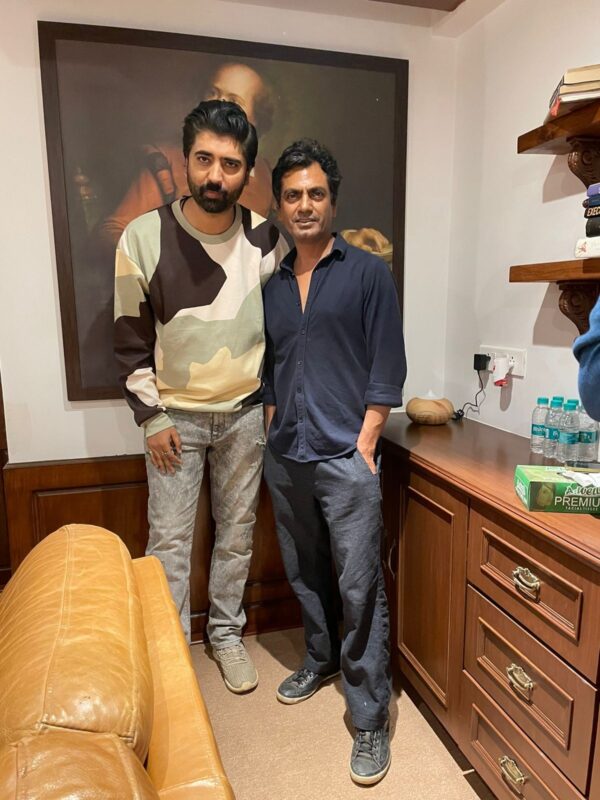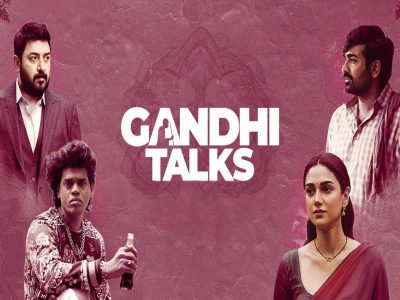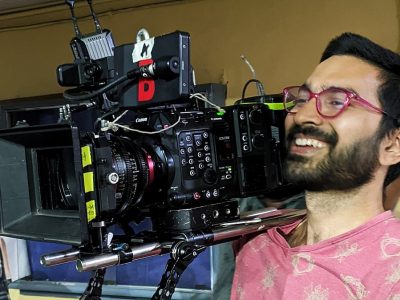Amit Tiwari Anand is among those in Bollywood who act as well as write.
The alumnus of Films and Television Institute of India (FTII), Tiwari, has also received the Kaifi Azmi Award and is an actor with Delhi’s Pierrot’s Troupe.
Initially, he made name as the writer of Gilehri (The Squirrel) which was part of National Film Development Corporation of India (NFDC) Writer’s Lab 2017. Gilehri was part of prestigious Film Bazaar, Goa.
Also read: Took one and a half years to write and research Rafuchakkar: Ritam Srivastav
He also got famous for an IDBI bank advertisement and a slogan Main Hindu hoon, bewakoof nahi (I am a Hindu, not a fool), which went viral during struggle for freedom of speech by students in Jamia Millia Islamia and Shaheen Bagh in New Delhi.
Bollywood’s belly
The story of the making of a new screenplay/dialogue writer in Bollywood remains tragic and layered, complex and compromised. It is an insecure, uncomfortable zone to work in, yet full of hope, opportunities and bonhomie. It is learnt the hard way.
This wise boy from Delhi reached Mumbai in 2013 and made it to writing his debut feature film with Irrfan Khan and director Sai Kabir. After Irrfan’s death, Nawazuddin Siddiqui replaced him and the film Tiku Weds Sheru finally hit the cinema halls recently.

hard at the house of playwright Sayeed Alam in order to
learn tricks of the trade
The film has garnered bad to mixed reviews.
Why did that happen? Is Tiwari a mediocre writer or is there a story behind it? How does film industry treat a new film writer?
“Bollywood is an unorganised industry, so there is no format to work here. For a newcomer, initially, it is a dark alley, unless he/she has lapped up a big project with a big banner (production house). The lapping up, however, has its own tales of compromises,” Amit says, mincing no words.
Despite claims that there is a demand for good writers in Bollywood and all OTT platforms, a writer’s struggle is immense.
“A writer’s place is the lowest, at times even lower than a spot boy.”
Among almost 1,000 films made every year in Bollywood, most films fail because a good writer’s script/screenplay is highly compromised. The producers, directors not only omit portions/characters from the original stories but also add things on their own whims assuming that it would be commercially viable.
A writer is not even welcome on the sets.
“Forget about welcoming, they even ask writers/screenplay-wrights not to come for few hours or better still, not come at all. This is said under the guise of ‘producers keh rahe hain, yahaan writer ka kya kaam? Uska kaam to humne le liya (Producers are saying why is the playwright needed, we have already got his work)’. For a person of self-respect, this is not a space to be. While unfortunately he can witness how the original story is messed up with. A writer’s gut feeling that it shall ruin the film, often proves right.”
Not only that, Bollywood largely has, he says, greedy practice of taking undue credit with the original writer/screenplay-wright or a dialogue writer. In search of new projects, hence, writers have to ‘share’ a credit on things the directors have not even done anything of substance. “This is not an exception here, but almost a rule.”
Citing an example Amit goes back to the time he wrote Gilehri, a story inspired by infamous lynching of Akhlaq in Uttar Pradesh. He wanted to develop it as a film.
“It was a metaphorical satire in which a small Dalit boy asks his friends to hit at a shrub of jujube fruit, so all could eat them. Boys hit with a heavy stone and many jujubes fall on the ground. But a close scrutiny reveals that it’s the squirrel which has fallen dead. Now the boys insist their Dalit friend to do squirrel’s last rites, to which he refuses. And that’s where the actual story begins.”
Amit took the script to a producer/director of a famous film channel.
He asked him to change the Dalit boy to a poor boy!
“He said to me, ‘Change Dalit to a poor boy’. I said, ‘The largest issue in today’s India is an identity crisis of its many people. The whole story falls if I change it to a poor boy’. He asked me to add another foolish change.”
The story is with a producer and the result is awaited.
Coming to terms
If you wish to tell a real story, its identity is mutilated beyond recognition.
“And that’s why now I have started writing comedies. I also have to run my kitchen.”
There is more. Few of Amit’s films never got released, a script of his film was stolen by the same person he sold it to, and he made a huge film with it involving star cast.
Amit requests not publishing their names for fear of being treated as an outcast in the industry where he believes one day, with better production houses run by sincere people, his real talent would shine.
Financial corruption is another struggle newcomers have to face. Despite all paper-work, the man between producers and directors discover ways to gulp lion’s share of the money, leaving the writer high and dry.

play lead role in Tiku weds Sheru after the death of Irrfan
Khan
Citing an example, Amit shares that he had prepared draft of a story he was asked for and a sum of Rs 20 lakh was finalised. All the paper-work was done.
For any writer, registering his work of art with Screen Writers’ Association (SWA) helps them establish its authenticity, thereby preventing plagiarism or theft of the content. Still, the people between writers and producers are able to rule because of the finances involved.
“The distributer ran away with my script, giving me just one lakh. As I fell severely ill and got admitted to hospital, I kept on calling him but he appeared much later saying, ‘someone wants to buy it for 1.5 lakh, so I shall pay you some money!’”
After much hue and cry, instead of the Rs 20 lakh signed on initially, Amit managed to get Rs 6 lakh in bits and pieces even though the person had sold the script for Rs 30 lakh, ignoring all papers they had signed earlier.
“At times, the middlemen even put a condition that the writer will remove his name from SWA because he is getting money for his story! Thereby, the story gets its share of fame under some other writer’s name!”
But Amit has come to terms with the film industry’s way of working.
“I have made peace with it. We’ve got to live here and survive too,” he says with a spurious smile.
Rich boy humbled by struggle
Amit comes from a well-heeled family of politicians and bureaucrats in Bhopal, Madhya Pradesh. Ego was his second nature.
“I never went to buy anything from a shop close by. I would just shout from my window and the shopkeeper would come running. My parents pampered me to no end. I had all the amenities a rich child would have and they supported me in my decision to go to the world of films and explore my route to success.”
Son to Sudha Pathak, a noted social worker working for women’s rights and a former folk singer on All India Radio, and a voracious reader-bureaucrat father who publishes a magazine promoting new writers, Amit has been nurtured on bonhomie between all religions.
However, the Delhi to Mumbai journey of this pampered, fit, young man of six feet-two inches, with great looks and voice, is a tale of arrogance melted to humility for which he thanks his mentor, Delhi’s famous playwright, director and an expert on Ghalib, Dr Sayeed Alam.
He “unlearned” everything at Alam’s. A boy who was born with a silver spoon, whose mother ran after him with milk and breakfast as he would rush out of home on a bike, washed utensils at Alam’s home, brought ghar ka sauda (items of daily need), washed his car, played nanny to his tiny daughters all day and did extra work behind the camera to learn how egos are crushed in the creative world.
“For nearly four months, Alam Sahib didn’t give me any role but asked me do backstage chores, for instance, ordering tea at rehearsals and so on. I kept on being with him as I could make out that he knew so much as a teacher that no one in his team did. I wanted to learn, so I slept on the floor. I was a vegetarian, but I ate at his place where non-vegetarian food was regularly cooked. I was also in the august company of Tom Alter sahab.
“I would keep on asking Alam saab, how could I become a good actor? On repeatedly asking, he once said, ‘You have to work very hard’. I asked what kind of hard work? ‘Read! Read a lot’! And that became my guru mantra. I started reading with intensity, the likes of Munshi Premchand and Manto, Bhisham Sahni, biographies, autobiographies, short stories, dramas, folk tales, poets like Basheer Badr, Harishankar Parsai and Harivansh Rai Bachchan and more. So much so that I started feeling the characters and living the situations around me. This provided a fertile ground for my imagination, it also further strengthened my belief in Ganga-Jamuni tehzeeb.”
Workstation
Amit is stationed at Mumbai for over a decade now.
“I have been acting for some years now. Life was smooth. But the writer in me kept popping up. A meeting with Irrfan Bhai, and I wrote the screenplay of Tiku Weds Sheru. It was a dream come true.”
Compromises done on the script don’t bother him anymore.
Husband to a gynaecologist, and father to a three-year-old daughter, Amit now has a political web series drama called Candidate, a new film and regular acting workshops at hand.
Any last words?
“Our film industry needs to be courageous, keep itself clean on taxes first.”
His words are layered. A writer after all!





